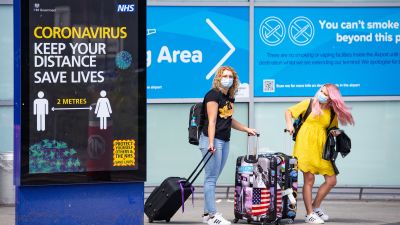Which countries could be put back on the UK quarantine travel list?

The UK government threw thousands of holidays into disarray by requiring arrivals from Spain to enter quarantine on Saturday and has indicated more countries may face similar measures.
Spain was initially included on the list of nations that were exempt from the two-week quarantine rule for foreign arrivals, but last weekend the government reversed the decision after the country saw a spike in cases.
Several popular tourist areas in the country like the Costa Del Sol, Malaga and Barcelona have seen outbreaks in recent weeks.
The UK government went a step further and added the Balearic and Canary Islands to the quarantine list on Monday.
What's the situation like across the rest of Europe?
Cases are rising across Europe
Infection rates have been rising across Europe in recent weeks, raising the prospect of more countries being put back on the list.
According to the European Centre for Disease Prevention and Control, the UK has had 12.4 cases of Covid-19 per 100,000 people over the past two weeks and Spain had more than four times that at 50.7.
Close to 1.8 million holidays are likely to have been thrown into chaos by the move to remove Spain from the list, according to travel company The PC Agency.Could your European holiday be at risk? Here is the situation in some of the most popular destinations.
France
Cases have been rising in France and its two-weekly infection rate has surpassed the UK's at 17.7 per 100,000 people.
The French government is moving to control the recent uptick in cases and has raised the prospect of local lockdowns if the situation deteriorates.
Face masks are compulsory on all forms of public transport in the country but there is a wide variation in the regions on rules for wearing masks in shops and restaurants.
Germany
The infection rate is relatively low in Germany at 8.0 per 100,000 people over the past two weeks, but the country is growing increasingly afraid of a second wave.
The country recently quarantined a part of Bavaria after around 500 farm workers tested positive for the virus.
Other areas of the country currently suffering outbreaks are North Rhine-Westphalia and Baden Wurttemberg.Italy
The epicentre of Europe's outbreak at the outset of the pandemic has managed to keep cases under control since emerging from lockdown.
The infection rate per 100,000 people for the past 14 days stands at 5.4.
ITV News Europe Editor James Mates reports on the precarious situation across Europe
Some areas are seeing signs of a resurgence, with residents of Rome recently being warned a local lockdown could be imposed.
Lombardy, which was the hardest hit area of the country at the start of the pandemic, still accounts for the highest number of cases in Italy.
Greece
The Mediterranean country managed to avoid having a serious outbreak and has managed to keep its infection rate at 4.0.
The country is wary of bringing in more cases from foreign arrivals and requires every foreign arrival to fill out a Passenger Locator Form.
The form asks for information on who they're travelling with, where they're going and their home address.
Masks are also required either by staff or customers in most indoor public spaces.
Luxembourg
The government is expected to discuss the "growing concern" around coronavirus in Luxembourg.
The infection rate per 100,000 people over the past 14 days has rocketed to 240.6.
Talks continued on Wednesday night with the UK's devolved administrations. Officials want to reach a UK-wide agreement before adding more countries to the travel quarantine list.
Belgium
Officials are also concerned about a steady rise in the infection rate in Belgium.
The rate stands at 31.8 per 100,000 people from the past 14 days.
The situation there is being monitored closely by UK officials looking to adjust quarantine rules if required.
What other countries in Europe are at risk of being put back on the quarantine list?
Several countries on the quarantine exemption list have higher rates than the UK:
Austria - 19.5 per 100,000 people
Croatia - 23.8
Malta - 22.7
Netherlands - 13.7
Poland - 14.8
The government is regularly updating the list of countries exempt from quarantine, with five more added on Tuesday – Estonia, Latvia, Slovenia, Slovakia and St Vincent and the Grenadines.
However, the Government said anyone who arrived in England from these countries before Tuesday would still need to self–isolate.
British holidaymakers face a £1,000 charge if they fail to self-isolate after arriving from a foreign country that is not on the exemption list.